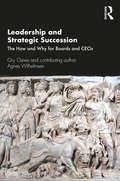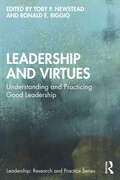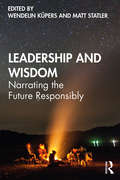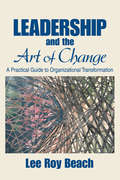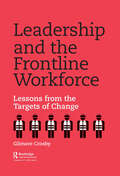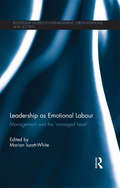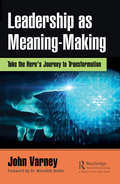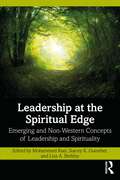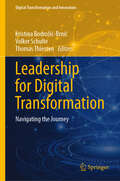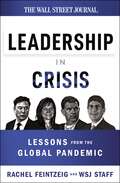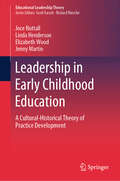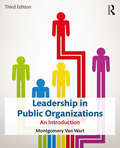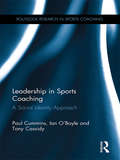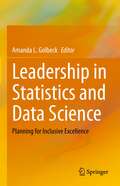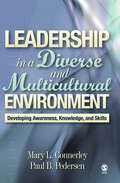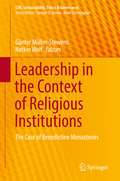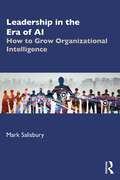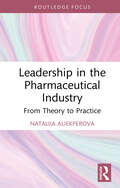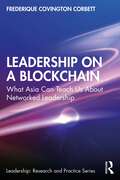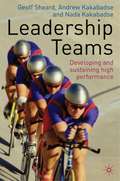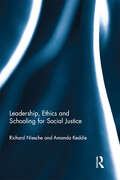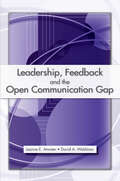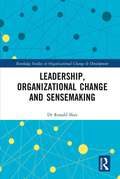- Table View
- List View
Leadership and Strategic Succession: The How and Why for Boards and CEOs
by Gry Osnes Agnes WilhelmsenBased on a review of the literature and several in-depth case studies, this book suggests a strategy-as-practice framework for succession and explores leadership logic, trust and followership. This book takes the reader through the key stages and disciplines required for effective top-level succession. Corporations, growing entrepreneurial companies and family owners all must manage strong group dynamics and individual needs in a succession transition. This book includes a wide range of global client cases, including public sector organizations, corporations, entrepreneurial firms and family owners. Based on rigorous research and written in an accessible style with a focus on practical needs, readers will also be able to combine this analysis within disciplines of governance, leadership, strategy and organizational development. This book will be of interest to students at an advanced level, academics and reflective practitioners as well as executives at the top levels of businesses.
Leadership and Virtues: Understanding and Practicing Good Leadership (Leadership: Research and Practice)
by Ronald E. RiggioGood leadership is something every leader and organization should strive towards. This book serves as a pivotal resource in encouraging the understanding and practice of leadership and highlights how good leadership is anchored in the rich philosophy and science of virtue. Through a diverse range of perspectives, the book highlights the importance of leading with virtue, unpacks what it means to be a virtuous leader, and outlines practical strategies for developing and practicing good leadership. Taking a virtues perspective, this cohesive collection of chapters by scholars from around the globe offers an inclusive tone and speaks to practicing and aspiring leaders worldwide. Readers are provided with a nuanced account of the nature of virtues and leadership and how the two interact on multiple levels and in multiple ways to inform the practice of good leadership. Focusing on the tradition of virtue gives this collection a robust scholarly foundation, while simultaneously providing scope for diverse views on how and why virtues inform good leadership. The book offers a balance of scholarly and practice-oriented chapters, instilling readers with a deep understanding of virtues and leadership, and practical strategies to develop their practice of good and virtuous leadership. Each chapter offers a different moral and sociological insight, serving altogether to show readers the most effective ways to use virtues to promote shared well-being and collective success. Scholars, students of leadership and management, and leadership practitioners will benefit from the accessible and practical lessons this book has to offer. This volume will also be of interest to team leaders and managers who are keen to develop their leadership skills in both practice and theory.
Leadership and Wisdom: Narrating the Future Responsibly
by Matt Statler Wendelin KüpersLeadership and Wisdom: Narrating the Future Responsibly gives business students and practitioners the opportunity to re-read tales, poems, myths and fables that have been interpreted by leading management scholars in order to translate the world’s folk wisdom into insightful and actionable lessons for a more responsible leadership practice. Most, if not all, cultures generate narratives that teach people how to make sense of the world and how to respond to challenges with wisdom. These sources provide a medium for character, as well as a guide for decision-making in ambiguous and uncertain circumstances. Management and organization scholars increasingly focus on what narrative wisdom traditions can teach us about leadership and organizational practices, and this book is designed to bring it to students and practitioners. Statler and Küpers have assembled a world-class team of contributors, who reflect on narratives near and dear to them, and draw out the lessons for leaders. With consistency throughout and end-of-chapter questions, this book enables all readers – including undergraduate and postgraduate students of leadership, management and organization studies, as well as interested researchers and practitioners – to reflect on the contents and implications of folk wisdom.
Leadership and the Art of Change: A Practical Guide to Organizational Transformation
by Professor Lee Roy BeachLeadership and the Art of Change is a unique book in that it focuses on a leader's central and most daunting task—achieving organizational change that successfully addresses external and internal threats and opportunities. Author Lee R. Beach uses six prime responsibilities as the framework for discussing change leadership: external and internal environmental assessment to identify required changes, organizational culture as a constraint on change, vision for motivating change; plans as a map for change, implementation to produce change, and follow-through for institutionalizing achieved changes and making ongoing change a part of the culture.
Leadership and the Art of Change: A Practical Guide to Organizational Transformation
by Professor Lee Roy BeachLeadership and the Art of Change is a unique book in that it focuses on a leader's central and most daunting task—achieving organizational change that successfully addresses external and internal threats and opportunities. Author Lee R. Beach uses six prime responsibilities as the framework for discussing change leadership: external and internal environmental assessment to identify required changes, organizational culture as a constraint on change, vision for motivating change; plans as a map for change, implementation to produce change, and follow-through for institutionalizing achieved changes and making ongoing change a part of the culture.
Leadership and the Frontline Workforce: Lessons from the Targets of Change
by Gilmore CrosbyThis book is for anyone who wants to lead change. It explains change methods through real-life experiences of frontline workers. Just as history has primarily been written by the victors, leadership and management theory have been written from the top. An exception is Kurt Lewin, whose action-research established that people on the frontlines are best positioned to create and sustain change. This book’s authors have practiced that approach over two generations for the past 70 years. They were deeply influenced by the blue-collar wisdom of the author’s grandfather, an hourly worker in the railyards of Pittsburgh.Leadership and the Frontline Workforce teaches via interviews of those who were present both before and after Lewin‑style change, telling the stories of the workers who have experienced the good, bad, and the ugly of being targets of change at the bottom of systems. A colleague of the author, Cotton Mears (1956–2019), intended to write this book but only got as far as a title, “View from a target.” He was a pot room tender in Alcoa’s Warrick aluminum smelter—one of the toughest jobs in the plant—when Robert P. Crosby arrived on the scene. Their relationship launched Cotton’s own organization development career. Following Cotton’s untimely death in 2019, Robert’s son, Gilmore Crosby, felt inspired to bring this book to life.
Leadership as Emotional Labour: Management and the 'Managed Heart' (Routledge Studies in Management, Organizations and Society)
by Marian Iszatt-WhiteEven if we don’t realise it, most of us are now familiar with the idea of ‘emotional labour’; that ‘service with a smile’ which everyone from cabin crew to restaurant or call centre staff is expected to give, irrespective of what they actually feel or think. This book considers the complex ways in which this need to show (or hide) particular emotions translates into job roles – specifically those of leaders or managers – where the relationships are lasting rather than transient, two-way rather than uni-directional and have complex, ongoing goals rather than straight-forward, one-off ones. The book contends that these differences contribute unique characteristics to the nature of the emotional labour required and expounds and explores this new genus within the ‘emotional labour’ species. The main theme of this book is the explication and exploration of emotional labour in the context of leadership and management. As such, it focuses both on how our understanding of emotional labour in this context enriches the original construct and where it deviates from it. By exploring these issues at the level of situated practices and the real world, real time experiences of leaders, the book seeks to make an innovative and nuanced contribution to our understanding of the emotional element within ‘leadership work’.
Leadership as Meaning-Making: Take the Hero's Journey to Transformation
by John VarneyBased on the author’s 30 years experience of management development and a background in design and psychology, this book takes a fresh look at leadership as a systemic shared phenomenon. It is one aspect of the evolutionary principle of bringing people to maturity as human beings – transforming the immature through purposeful adventure. This is not a “how-to” book of tools and techniques but is a guide to personal development. It plots the territory of the hero’s journey (after Joseph Campbell) through unknown worlds. It explains the metaphorical relationship to personal and collective transformation by means of the cyclic pattern of the hero’s journey, overlaid with the enneagram framework. Succeeding chapters spell out practical details for making the journey towards maturity, which alone makes leadership a viable possibility. Only such purposeful leadership will enable others to make their own equivalent journeys. If such people are engaged in work, then they will be more conscious and more effective. Essentially, the book is intentionally quickly communicates a broad sweep of related ideas that form a philosophy for the development of the inner qualities of effective leadership, applicable in all walks of life. The story of the archetypical hero’s journey is suggested as applying to every individual. The hero’s journey is an allegory for a quest for inner growth. It can rub off onto others through what we call “leadership”. Such leadership is what brings meaning to people’s lives. Thus this book is a counter to the empty manipulative techniques propagated by much of the popular writing on leadership, which pays little attention to transformative interaction. There are exercises at the end of each chapter and additional material is available to readers via the internet.
Leadership at the Spiritual Edge: Emerging and Non-Western Concepts of Leadership and Spirituality
by Mohammed Raei Stacey K. Guenther Lisa A. BerkleyThis insightful book explores the intersection of spirituality and leadership, examining cutting edge research, theory, and practices that help build healthy and long‑term effective leadership. Showcasing non‑Western views of leadership across a range of backgrounds, the book looks at leadership styles that raise and expand consciousness to enable better problem solving when addressing the complex challenges of organizations and societies.Across four sections, the book considers a myriad of themes from surrender to compassion, the dark and shadow side to the illuminating light of love, as well as offering a spotlight on individual leader development to highlight the role of the collective. Each chapter individually and collectively represents the essence of a profound shift in how leadership is approached in the 21st century. The volume offers a variety of viewpoints addressing this spiritual turn in leadership scholarship, and provides leadership tools to assist leaders in honing their practices to address contemporary challenges and unleash their full potential.In a world where the challenges are immense and multifaceted, this anthology explores leadership that transcends the mundane and ventures into the extraordinary. Leadership at the Spiritual Edge will be of use to researchers, scholars, and students of leadership studies, particularly those interested in new ways of viewing and developing leadership.
Leadership for Digital Transformation: Navigating the Journey (Digital Transformation and Innovation)
by Volker Schulte Kristina Bodrožić-Brnić Thomas ThiessenThis book focuses on innovative leadership in change management amid digital business transformation. By combining theoretical insights with practical guidance, case studies, and a transdisciplinary approach, it not only provides up-to-date insights for researchers but also equips leaders with the skills, knowledge, and tools necessary to successfully guide their organisations through the challenges and opportunities of the digital age. It primarily emphasises placing human considerations at the forefront of discussions regarding digital transformation. The book features contributions that tackle essential topics, such as developing a digital mindset, the psychological challenges of digital transformation, and innovative leadership roles, addressing specific areas such as small and medium-sized companies, the creative industry, family-run businesses, and aspects of the Gen Z generation. It emphasises the use of innovative technologies such as AI to explore diverse perspectives on risk-taking, responsible leadership, building a resilience culture, international views on managing digitalisation, and the strategic use of communication in digital change processes. Under the three focus areas 'Success Factors and Innovative Leadership in Digital Change Management,' 'Digital Transformation in Counterpoint to Conventional Methods,' and 'Leadership Mindset for Digital Transformation,' it transcends conventional literature by offering a transdisciplinary investigation of leadership in the digital age, revealing crucial perspectives, and delivering actionable strategies to meet the evolving challenges of organisational change. This volume provides valuable insights and knowledge tailored for professionals in business and management but is equally beneficial for researchers and students aiming to deepen their theoretical understanding. Additionally, it offers practical guidance and real-world case studies to support consultants, entrepreneurs, and policymakers alike.
Leadership in Crisis: Lessons from the Global Pandemic
by Thomas NelsonThe Covid crisis has been a proving ground of sorts for business leaders, forcing them to adapt to new realities and unprecedented uncertainty. Leading through it has often been painful, but it&’s also produced valuable lessons about rallying employees, navigating global pressures, and finding opportunity amid hardship.Leadership in Crisis profiles leaders of a range of business from auto giants like Telsa and General Motors to Moderna, the upstart that developed a Covid-19 vaccine, to a small grocery store in North Carolina. Takeaways include:Take advantage of a crisis to try something new.Channel your scrappiness and tenacity.Be of service.Turn to Leadership in Crisis and remember that when the world breaks, there are all kinds of opportunities to make it better, for your business and beyond.
Leadership in Early Childhood Education: A Cultural-Historical Theory of Practice Development (Educational Leadership Theory)
by Elizabeth Wood Jenny Martin Joce Nuttall Linda HendersonThe book presents a conceptual framework for understanding leadership for effective educator learning in early childhood settings. The book describes how leaders can move centre practices from crisis to stabilization. It argues that a core component of leaders' work in early childhood settings is to construct and enact epistemological accounts of practice change. The book includes case examples that bring to life the contexts early childhood services and services leaders who participated in the research. The book also describes the application of cultural-historical activity theory to the development of practice in early childhood education. It describes how background theory, literature, and data can be synthesized to create new focal theory in education. Readers will benefit from the theory that is presented, establishing a sound basis for testing in future research in schools as well as in early childhood education. “Joce Nuttall and team are congratulated for their ground-breaking scholarly endeavour in designing, implementing, validating findings, and then writing a book that unambiguously connects theory-policy-practice in enacting leadership in early childhood settings. This book is ambitious, eloquent, and inspirational. The research was driven by a bold vision to build a new theorisation of early childhood leadership. The writing style of the book makes the complex clear and easy to digest, and thereby strengthening its readability and understanding. The comparative lens adopted in the study, underscores the neoliberal control of the working lives of early childhood leaders in both Australia and England. The use of case study narratives to explain various aspects including the study design and methodology, was refreshingly engaging. Notes of encouragement addressed to novice researchers such as those embarking on higher degree studies, also provide apt guidance about the messiness of conducting qualitative research. The book is infused with lots of examples demonstrating the transformative power of learning – especially when expertly scaffolded by the research team, and thereby increasing practitioner agency and quality improvement across the early childhood setting. If professional autonomy is the driver of reform and change, then we must find ways to nurture strong educational leaders who can think outside the box. Overall, Nuttall and team succeed in arousing learning-rich possibilities for reimagining early childhood leadership in theory and in practice, and thereby making a magnificent contribution to the scholarship of educational leadership.” Professor Manjula Waniganayake PhD, Macquarie University, Sydney, Australia
Leadership in Public Organizations: An Introduction
by Montgomery Van WartLeadership in Public Organizations is a concise yet comprehensive treatment of public sector leadership for upper division and graduate students. In addition to a full, up-to-date review of leadership theories in the field, it covers the major competency clusters in detail, and provides both the research on each competency and practical guidelines for improvement. These competencies are graphically portrayed in a Leadership Action cycle that aids students in visually connecting theory and practice. Important features of the text include discussion questions and scenarios at the end of each chapter, numerous exhibits, and an easily reproducible leadership assessment instrument. Although designed for course use in a Public Administration program, Leadership in Public Organizations can also serve as a guidebook for professionals seeking insight into the role of successful leadership behavior in public sector management.
Leadership in Sports Coaching: A Social Identity Approach (Routledge Research in Sports Coaching)
by Ian O'Boyle Tony Cassidy Paul CumminsThe professionalisation of sports coaching has demanded higher standards of leadership in order to improve performance and effectiveness. This book focuses on leadership in sports coaching, exploring key concepts and principles underpinned by a presentation of new empirical research. Placing social identity theory at its centre – a theory not previously applied to sports coaching – this book provides students and researchers with a powerful tool for understanding the complex social dynamic that is the coaching process. Its chapters cover all the central aspects of sports coaching, including leadership style, measuring effectiveness, motivation, confidence and team self-esteem. Chapters explore different coaching environments to investigate the extent to which social identity impacts on coaching and leadership. A ground-breaking contribution to this field of research, this book demonstrates the significance of social identity theory in sport for athletes, coaches and leaders. Leadership in Sports Coaching: A social identity approach is an illuminating read for any student or researcher with an interest in coaching theory, coaching practice, sport psychology, sport leadership or sport management.
Leadership in Statistics and Data Science: Planning for Inclusive Excellence
by Amanda L. GolbeckThis edited collection brings together voices of the strongest thought leaders on diversity, equity and inclusion in the field of statistics and data science, with the goal of encouraging and steering the profession into the regular practice of inclusive and humanistic leadership. It provides futuristic ideas for promoting opportunities for equitable leadership, as well as tested approaches that have already been found to make a difference. It speaks to the challenges and opportunities of leading successful research collaborations and making strong connections within research teams. Curated with a vision that leadership takes a myriad of forms, and that diversity has many dimensions, this volume examines the nuances of leadership within a workplace environment and promotes storytelling and other competencies as critical elements of effective leadership. It makes the case for inclusive and humanistic leadership in statistics and data science, where there often remains a dearth of women and members of certain racial communities among the employees. Titled and non-titled leaders will benefit from the planning, evaluation, and structural tools offered within to contribute inclusive excellence in workplace climate, environment, and culture.
Leadership in a Diverse and Multicultural Environment: Developing Awareness, Knowledge, and Skills
by Paul B. Pedersen Dr Mary L. ConnerleyLeadership in a Diverse and Multicultural Environment provides leaders with the tools necessary to effectively interact with all individuals. Although much of the research related to multiculturalism has focused on expatriates and international assignments, the book also focuses on leaders in domestic organizations, as they can benefit from developing their own multicultural awareness, knowledge, and skills. Effective leaders can shape the culture of their organization to be accepting of individuals from all races, ethnicities, religions, and genders with a minimum of misunderstandings.
Leadership in the Context of Religious Institutions: The Case of Benedictine Monasteries (CSR, Sustainability, Ethics & Governance)
by Günter Müller-Stewens Notker WolfThis book explores opportunities and limitations with regard to transferring knowledge and tools from the corporate world to manage monasteries or other types of religious institutions. To do so, the contributing authors analyze both the ideological and practical implications of employing modern organizational theory in the context of religious institutions, and seek to strike a balance between preserving traditions and promoting modernization. In this regard, they draw on experience gained in the course of long-standing collaborations between religious institutions, such as monasteries, and business and management schools.
Leadership in the Era of AI: How to Grow Organizational Intelligence
by Mark SalisburyWhat will be the right place for humans in the new economy of AI, avatars, automation, and 3D virtual worlds? Our job will be to bring wisdom to our workplace and the marketplace, working with intelligent machines, and this book is the roadmap.Though it addresses growing fears about the future of work, The Future of Leadership is about more than specific technologies. It’s about building organizational intelligence (OI): the capability of an organization to comprehend and create knowledge relevant to its purpose. To increase organizational intelligence requires a new kind of knowledge worker—a wisdom worker—who requires a new kind of leadership. Written in an engaging business novel format, this book is the story of how to become a leader of wisdom workers and be successful in the emerging wisdom economy.Seasoned and emerging leaders in all industries, as well as talent development professionals, will value this book’s insights into how to step confidently into the developing work paradigm, bringing human values and wisdom together with the latest AI in the real and virtual worlds.
Leadership in the Pharmaceutical Industry: From Theory to Practice (Routledge Focus on Business and Management)
by Nataliia AliekperovaLeadership in the Pharmaceutical Industry focuses on leadership in pharmaceutical organisations at three levels: individual, team, and organisational. At the individual level, it covers leadership basics, theories, types of leaders, differences between leaders and managers, leadership traits and skills, and systems thinking. At the team level, it explores leadership styles, the leader’s interaction with the team, and employee motivation, including the use of intrinsic motivational factors. At the organisational level, it examines the leader’s role in creating and maintaining organisational culture, forming and implementing organisational strategy, and managing organisational changes.The book also addresses the specifics of the pharmaceutical industry, including the types and characteristics of innovations and the ethics of leader behaviour, emphasising the importance of ethical leadership. Notably, leadership issues are illustrated with practical cases featuring prominent leaders such as Paul Janssen, Daniel Vasella, Charles Walgreen III, John C. Martin, Roy Vagelos, Albert Bourla, Kiran Mazumdar-Shaw, and Filya Zhebrovska. These leaders were or are involved in creating, manufacturing, and providing patients with pharmaceutical products.The book is designed to benefit readers from various business sectors, with the primary audience being academics, students, and individuals interested in leadership in the pharmaceutical industry.
Leadership on a Blockchain: What Asia Can Teach Us About Networked Leadership (Leadership: Research and Practice)
by Frederique Covington CorbettLeadership on a Blockchain: What Asia Can Teach Us About Networked Leadership is an authoritative text that goes to the foremost digitally connected markets of the world in Asia, and accounts for how leaders and teams are exercising leadership Darwinism to adapt for agility and connectivity. The book begins by offering a contextual grounding for new leadership ideas to emerge. It contends that a "new geography of leadership" is unfolding as the world shifts away from unified globalist ideology and a dominant Western view of leadership. It moves on to describe how Asia is uniquely placed to become the leadership sandbox for the future. It accounts for how leaders and teams are exercising leadership Darwinism to adapt for agility and connectivity. To facilitate learning for the readers, this book includes creatives features such as the following: An abbreviated history of significant leadership milestones in the last century A leadership manifesto for the digital age A practitioners’ starter kit to reimagining leadership in their organizations. Leaving behind the typical discourse of leadership anchored in power, control, and hierarchy, it offers a provocative call to all businesspeople to apply the principles of one of the most innovative technologies – blockchain – to reimagine leadership for transparency, trust, and distributed decision-making. The book concludes by distilling critical lessons for global leaders to take forward and lead a revolution in their own organizations. Sharing first-person accounts from leaders and their teams in China, Singapore, India, and Indonesia, and combining this with insights from the author’s own research, Leadership on a Blockchain will be of use to leaders around the world looking to transform their own leadership. It will also be of interest to academics and students of leadership, change management, organizational behavior, and cultural studies.
Leadership teams
by Andrew GambleThe scale and complexity of today's corporations dictates that teamwork is essential to realising high performance. This book clearly identifies six critical stages to becoming a world class team, making this a must read text for ambitious and aspiring managers.
Leadership, Ethics and Schooling for Social Justice
by Richard Niesche Amanda KeddieIssues of social justice and equity in the field of educational leadership have become more salient in recent years. The unprecedented diversity, uncertainty and rapid social change of the contemporary global era are generating new and unfamiliar equity questions and challenges for schools and their leaders. In order to understand the moral and ethical complexity of work undertaken in the name of social justice and equity in diverse contexts, this book uses a range of different theoretical tools from the work of Michel Foucault. Rather than a prescriptive, best practice approach to leadership and social justice, this book draws on Foucault’s four-fold ethical framework, and specifically, the notions of advocacy, truth-telling and counter-conduct to critically examine the leadership work undertaken in case studies in schools in Australia and England. Our approach makes transparent the ethical work that leaders in these contexts conduct on themselves towards creating schools that can address the equity challenges of the present climate. It illuminates and enables critical analysis of the moral imperatives shaping the equity work of school leaders and, in particular, the possibilities for transformative leadership that can work to create schools and school systems that are more socially just. Overall, the book’s key aims are to: Provide an innovative and comprehensive theorising of leadership for social justice in contemporary times; Explicate the utility of key elements of Foucault’s theorising of the ethical self to the domain of educational leadership; and Provide significant practical insight into the social justice possibilities of school leadership in contemporary times through two in depth case studies
Leadership, Feedback and the Open Communication Gap
by David A. Waldman Leanne E. AtwaterThe topic of leadership has grown in importance, and how and when managers communicate is critical to their effectiveness. This book provides insight for managers to understand the feedback and open communication processes. It suggests guidelines for how and when managers should engage in negative feedback and open organizational-level co
Leadership, Organizational Change and Sensemaking (Routledge Studies in Organizational Change & Development)
by Ronald SkeaOrganizational change literature often focuses on the leaders role in giving sense to others of the need for change and there is a plethora of models and recipes on how to influence employees thinking about change, organizational design and performance. Notwithstanding this ready supply of advice, research has shown that up to 90% of change programs fail to deliver their expected outcomes. One of the reasons for this which has been neglected in the literature is that successful change in thinking starts with how leaders first make sense of the need for change and the challenges this poses to their own thinking. This book surfaces the elements behind leader sensemaking that add to or detract from their ability to critically question their current thinking. Leaders and interventionists have lacked practical and pragmatic advice on how to influence the process. This book is the culmination of 10 years of research spent working with leaders in organizations as they interpreted the need for change and made choices about engaging, or not, with transformational change methodologies. It reveals nine elements of sensemaking displayed by organizational leaders as they grapple with challenges to their current orthodoxies about how to lead and organize in times of change. The book shows the latest state of knowledge on the topic and will be of interest to researchers, academics, practitioners, and students in the fields of leadership, change, and organisational development.
Leadership, Organizational Change and Sensemaking (Routledge Studies in Organizational Change & Development)
by Ronald SkeaOrganizational change literature often focuses on the leaders role in giving sense to others of the need for change and there is a plethora of models and recipes on how to influence employees thinking about change, organizational design and performance. Notwithstanding this ready supply of advice, research has shown that up to 90% of change programs fail to deliver their expected outcomes. One of the reasons for this which has been neglected in the literature is that successful change in thinking starts with how leaders first make sense of the need for change and the challenges this poses to their own thinking. This book surfaces the elements behind leader sensemaking that add to or detract from their ability to critically question their current thinking. Leaders and interventionists have lacked practical and pragmatic advice on how to influence the process. This book is the culmination of 10 years of research spent working with leaders in organizations as they interpreted the need for change and made choices about engaging, or not, with transformational change methodologies. It reveals nine elements of sensemaking displayed by organizational leaders as they grapple with challenges to their current orthodoxies about how to lead and organize in times of change.The book shows the latest state of knowledge on the topic and will be of interest to researchers, academics, practitioners, and students in the fields of leadership, change, and organisational development.
